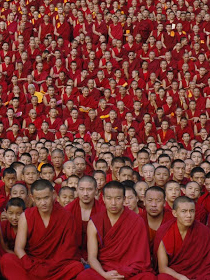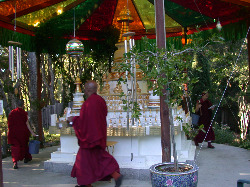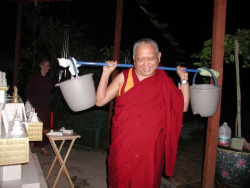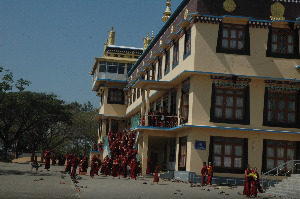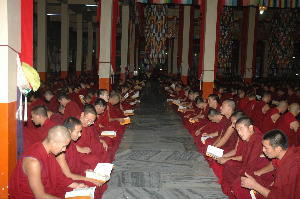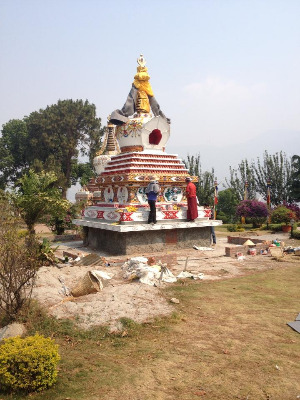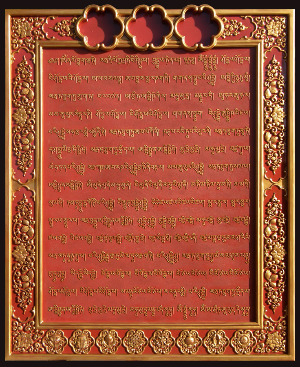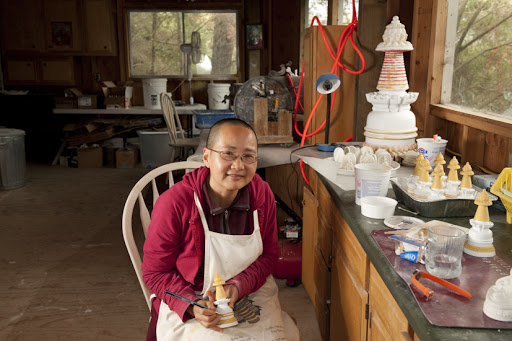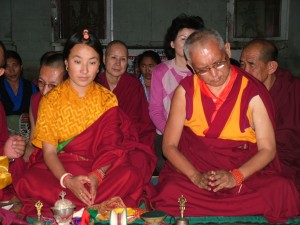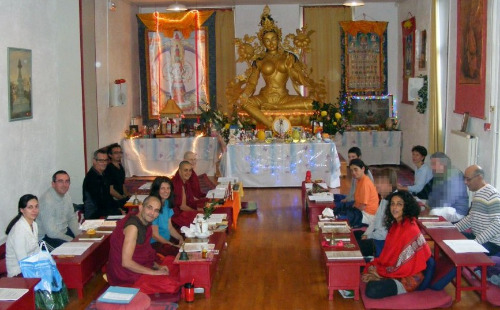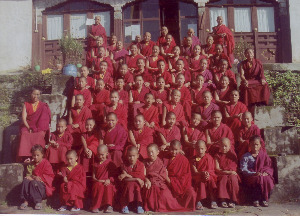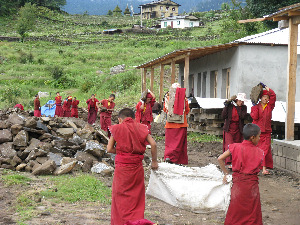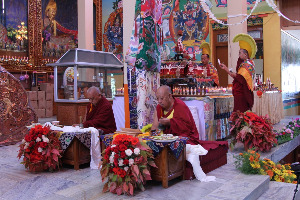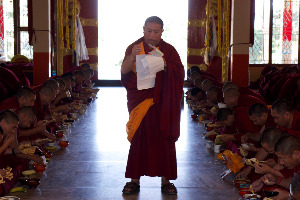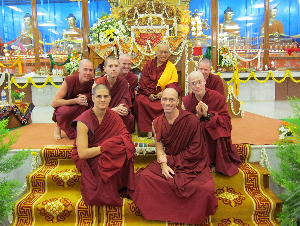- Home
- FPMT Homepage
Foundation for the Preservation of the Mahayana Tradition
The FPMT is an organization devoted to preserving and spreading Mahayana Buddhism worldwide by creating opportunities to listen, reflect, meditate, practice and actualize the unmistaken teachings of the Buddha and based on that experience spreading the Dharma to sentient beings. We provide integrated education through which people’s minds and hearts can be transformed into their highest potential for the benefit of others, inspired by an attitude of universal responsibility and service. We are committed to creating harmonious environments and helping all beings develop their full potential of infinite wisdom and compassion. Our organization is based on the Buddhist tradition of Lama Tsongkhapa of Tibet as taught to us by our founders Lama Thubten Yeshe and Lama Thubten Zopa Rinpoche.
- Willkommen
Die Stiftung zur Erhaltung der Mahayana Tradition (FPMT) ist eine Organisation, die sich weltweit für die Erhaltung und Verbreitung des Mahayana-Buddhismus einsetzt, indem sie Möglichkeiten schafft, den makellosen Lehren des Buddha zuzuhören, über sie zur reflektieren und zu meditieren und auf der Grundlage dieser Erfahrung das Dharma unter den Lebewesen zu verbreiten.
Wir bieten integrierte Schulungswege an, durch denen der Geist und das Herz der Menschen in ihr höchstes Potential verwandelt werden zum Wohl der anderen – inspiriert durch eine Haltung der universellen Verantwortung und dem Wunsch zu dienen. Wir haben uns verpflichtet, harmonische Umgebungen zu schaffen und allen Wesen zu helfen, ihr volles Potenzial unendlicher Weisheit und grenzenlosen Mitgefühls zu verwirklichen.
Unsere Organisation basiert auf der buddhistischen Tradition von Lama Tsongkhapa von Tibet, so wie sie uns von unseren Gründern Lama Thubten Yeshe und Lama Thubten Zopa Rinpoche gelehrt wird.
- Bienvenidos
La Fundación para la preservación de la tradición Mahayana (FPMT) es una organización que se dedica a preservar y difundir el budismo Mahayana en todo el mundo, creando oportunidades para escuchar, reflexionar, meditar, practicar y actualizar las enseñanzas inconfundibles de Buda y en base a esa experiencia difundir el Dharma a los seres.
Proporcionamos una educación integrada a través de la cual las mentes y los corazones de las personas se pueden transformar en su mayor potencial para el beneficio de los demás, inspirados por una actitud de responsabilidad y servicio universales. Estamos comprometidos a crear ambientes armoniosos y ayudar a todos los seres a desarrollar todo su potencial de infinita sabiduría y compasión.
Nuestra organización se basa en la tradición budista de Lama Tsongkhapa del Tíbet como nos lo enseñaron nuestros fundadores Lama Thubten Yeshe y Lama Zopa Rinpoche.
A continuación puede ver una lista de los centros y sus páginas web en su lengua preferida.
- Bienvenue
L’organisation de la FPMT a pour vocation la préservation et la diffusion du bouddhisme du mahayana dans le monde entier. Elle offre l’opportunité d’écouter, de réfléchir, de méditer, de pratiquer et de réaliser les enseignements excellents du Bouddha, pour ensuite transmettre le Dharma à tous les êtres. Nous proposons une formation intégrée grâce à laquelle le cœur et l’esprit de chacun peuvent accomplir leur potentiel le plus élevé pour le bien d’autrui, inspirés par le sens du service et une responsabilité universelle. Nous nous engageons à créer un environnement harmonieux et à aider tous les êtres à épanouir leur potentiel illimité de compassion et de sagesse. Notre organisation s’appuie sur la tradition guéloukpa de Lama Tsongkhapa du Tibet, telle qu’elle a été enseignée par nos fondateurs Lama Thoubtèn Yéshé et Lama Zopa Rinpoché.
Visitez le site de notre Editions Mahayana pour les traductions, conseils et nouvelles du Bureau international en français.
Voici une liste de centres et de leurs sites dans votre langue préférée
- Benvenuto
L’FPMT è un organizzazione il cui scopo è preservare e diffondere il Buddhismo Mahayana nel mondo, creando occasioni di ascolto, riflessione, meditazione e pratica dei perfetti insegnamenti del Buddha, al fine di attualizzare e diffondere il Dharma fra tutti gli esseri senzienti.
Offriamo un’educazione integrata, che può trasformare la mente e i cuori delle persone nel loro massimo potenziale, per il beneficio di tutti gli esseri, ispirati da un’attitudine di responsabilità universale e di servizio.
Il nostro obiettivo è quello di creare contesti armoniosi e aiutare tutti gli esseri a sviluppare in modo completo le proprie potenzialità di infinita saggezza e compassione.
La nostra organizzazione si basa sulla tradizione buddhista di Lama Tsongkhapa del Tibet, così come ci è stata insegnata dai nostri fondatori Lama Thubten Yeshe e Lama Zopa Rinpoche.
Di seguito potete trovare un elenco dei centri e dei loro siti nella lingua da voi prescelta.
- 欢迎 / 歡迎
简体中文
“护持大乘法脉基金会”( 英文简称:FPMT。全名:Foundation for the Preservation of the Mahayana Tradition) 是一个致力于护持和弘扬大乘佛法的国际佛教组织。我们提供听闻,思维,禅修,修行和实证佛陀无误教法的机会,以便让一切众生都能够享受佛法的指引和滋润。
我们全力创造和谐融洽的环境, 为人们提供解行并重的完整佛法教育,以便启发内在的环宇悲心及责任心,并开发内心所蕴藏的巨大潜能 — 无限的智慧与悲心 — 以便利益和服务一切有情。
FPMT的创办人是图腾耶喜喇嘛和喇嘛梭巴仁波切。我们所修习的是由两位上师所教导的,西藏喀巴大师的佛法传承。
繁體中文
護持大乘法脈基金會”( 英文簡稱:FPMT。全名:Found
ation for the Preservation of the Mahayana Tradition ) 是一個致力於護持和弘揚大乘佛法的國際佛教組織。我們提供聽聞, 思維,禪修,修行和實證佛陀無誤教法的機會,以便讓一切眾生都能 夠享受佛法的指引和滋潤。 我們全力創造和諧融洽的環境,
為人們提供解行並重的完整佛法教育,以便啟發內在的環宇悲心及責 任心,並開發內心所蘊藏的巨大潛能 — 無限的智慧與悲心 – – 以便利益和服務一切有情。 FPMT的創辦人是圖騰耶喜喇嘛和喇嘛梭巴仁波切。
我們所修習的是由兩位上師所教導的,西藏喀巴大師的佛法傳承。 察看道场信息:
- FPMT Homepage
- News/Media
-
- Study & Practice
-
-
- About FPMT Education Services
- Latest News
- Programs
- New to Buddhism?
- Buddhist Mind Science: Activating Your Potential
- Heart Advice for Death and Dying
- Discovering Buddhism
- Living in the Path
- Exploring Buddhism
- FPMT Basic Program
- FPMT Masters Program
- FPMT In-Depth Meditation Training
- Maitripa College
- Lotsawa Rinchen Zangpo Translator Program
- Universal Education for Compassion & Wisdom
- Online Learning Center
-
- Prayers & Practice Materials
- Overview of Prayers & Practices
- Full Catalogue of Prayers & Practice Materials
- Explore Popular Topics
- Benefiting Animals
- Chenrezig Resources
- Death & Dying Resources
- Lama Chopa (Guru Puja)
- Lama Zopa Rinpoche: Compendium of Precious Instructions
- Lama Zopa Rinpoche: Life Practice Advice
- Lama Zopa Rinpoche Practice Series
- Lamrim Resources
- Mantras
- Prayer Book Updates
- Purification Practices
- Sutras
- Thought Transformation (Lojong)
- Audio Materials
- Dharma Dates - Tibetan Calendar
- Translation Services
- Publishing Services
- Ways to Offer Support
- Prayers & Practice Materials
-
- Teachings and Advice
- Find Teachings and Advice
- Lama Zopa Rinpoche Advice Page
- Lama Zopa Rinpoche: Compendium of Precious Instructions
- Lama Zopa Rinpoche Video Teachings
- ༧སྐྱབས་རྗེ་བཟོད་པ་རིན་པོ་ཆེ་མཆོག་ནས་སྩལ་བའི་བཀའ་སློབ་བརྙན་འཕྲིན།
- Podcasts
- Lama Yeshe Wisdom Archive
- Buddhism FAQ
- Dharma for Young People
- Resources on Holy Objects
- Teachings and Advice
-
-
*If a menu item has a submenu clicking once will expand the menu clicking twice will open the page.
-
-
- Centers
-
- Teachers
-
- Projects
-
-
-
-
*If a menu item has a submenu clicking once will expand the menu clicking twice will open the page.
-
-
- FPMT
-
-
-
-
-
Think that everyone you meet is fulfilling all your wishes.
Lama Zopa Rinpoche
-
-
-
- Shop
-
-
-
The Foundation Store is FPMT’s online shop and features a vast selection of Buddhist study and practice materials written or recommended by our lineage gurus. These items include homestudy programs, prayers and practices in PDF or eBook format, materials for children, and other resources to support practitioners.
Items displayed in the shop are made available for Dharma practice and educational purposes, and never for the purpose of profiting from their sale. Please read FPMT Foundation Store Policy Regarding Dharma Items for more information.
-
-
Charitable Activities
18
Lives Liberated in 2012
In 2012 the Animal Liberation Fund liberated over 33,000 lives!
Sangha living at Lama Zopa Rinpoche’s residence performed three animal liberation practices every month, with extensive prayers and dedication to all who are sick or need prayers.
Please rejoice as the Animal Liberation Fund has now liberated well over 2,183,100 animals of varying sizes!
Please read this touching short story about Lama Zopa Rinpoche carrying 400 of his “fathers and mothers” on his back, as seen in the photo on the left.
- Tagged: animal liberation fund
18
Sera Je Monks Perform Pujas
Each month, pujas are performed by as many as 9,000 Sangha. The enormous number of Sangha engaged in these practices is an extremely powerful means to overcome obstacles and create merit for the entire organization.
17
Amdo Eye Hospital Update
January 2013: Ven. Roger Kunsang and Frances Howland met with Dr. Ruit to discuss FPMT’s Tibet Heath Services Project and its ongoing aims, as well as reviewing the Amdo Eye Hospital and future plans for possible eye camps.
Due to the situation in the area we are not able to arrange a big scale eye camp at this time, but within a year we hope to be able to arrange this with Dr. Ruit. These eye camps provide up to 500-700 surgeries. The cost to arrange an eye camp of this scale is US$40,000 and we are currently raising funds for this.
In the meantime, the Amdo Eye Hospital is still able to do smaller scale remote eye camps where up to 30-35 eye surgeries are performed every three or four months.
In 2012 the Amdo Eye Hospital was able to perform over 578 eye surgeries and it is envisioned that 2013 will bring much more.
- Tagged: tibet health services project
17
$4,518 Offered to the Geluk International Foundation
The Lama Tsongkhapa Teachers Fund was very happy to support the Geluk International Foundation which is establishing an office at Ganden Monastery, Tibet, as well as accommodation for Ganden Tripa by donating $4,518 for two computers and office equipment and furniture.
Please read a letter of thanks from the President of the Geluk International Foundation.
- Tagged: lama tsongkhapa teachers fund, projects
17
Photo: Early stages of the construction of Khensur Rinpoche Lama Lhundrup’s stupa.
From the Sutra Essence of Earth:
While there are the three rare sublime ones
Fulfilling the hopes without any effort
Like the unimaginable wish-granting tree and wish-granting jewel;
[But] believing the method to achieve happiness is something else
All the activities one attempts become only negative karma
And this precious human rebirth with qualified freedoms and richnesses,
Which is rarer than a wish-granting jewel, becomes meaningless and empty;
It becomes only a cause of harm;
This is more foolish than an animal.
Friend, by realizing this body, this life is like a water bubble
And material enjoyments like the dew on the tip of the grass
Attempt the white (virtuous) actions, offer to the three rare sublime ones (Buddha Dharma, Sangha)
And take the essence from this essenceless body and possessions.
Due to this merit may I and each and every sentient being respect
And make offerings to the three rare sublime ones;
By the happiness of the joyful occasion of listening, reflecting, meditating and practicing
May all the transmigratory beings’ wishes be completely fulfilled.
Colophon: Advice from Lama Zopa Rinpoche regarding having many holy objects. Scribe Ven. Holly Ansett, Buddha Amitabha Pure Land, Washington, USA, November 2003. Lightly edited by Ven. Thubten Labdron, May 2004.
17
You can read more about this Namgyälma mantra board and Pam Cayton’s efforts in this recent Mandala blog post.
10
Over 1,000 Kadampa Stupas Created!
In 2012 The Stupa Fund sponsored the cost of Sangha at Lama Zopa Rinpoche’s house to make over 1,000 small kadampa stupas (filled with the Four Dharmakaya Relic Mantras as advised by Lama Zopa Rinpoche). Each stupa is dedicated with prayers for those who have recently passed away.
These small stupas are then placed around other stupas so that people can circumambulate this collection of stupas and create merit.
Photos: Vens. Anet (above) and Chosang (below) creating kadampa stupas at Lama Zopa Rinpoche’s house. Photo by Whitney Dafoe.
- Tagged: stupa fund
7
Regarding Stupas to Minimize Harm from the Elements
Lama Zopa Rinpoche had the following to say about the Stupa to Minimize Harm from the Elements project:
This is a very important project that we have started, it has incredible importance. We all know there will be another earthquake on the west coast of the USA, it is overdue and it could be a huge earthquake where so many people could die and there could be huge damage to buildings, houses and structures. There is also the danger of a tsunami and the serious effects that will have.
If people were told it was going to happen beforehand, in many cases it would be hard for them to believe. In many respects the mind is not familiarized in the nature of impermanence and karma, or in change that is happening all the time: rising and ceasing, birth and death, collecting and dispersing. Everything is continuously in a state of change but mostly we are unaware and when it happens it is a great shock and surprise.
I am thinking that of course the government does have certain expertise and technical ability to deal with disasters, but it is limited, they have little understanding and knowledge of the help that can come from other sources of understanding reality. The human mind has enormous potential, that potential could have positive or negative outcome. For example, one person who has great power over many could kill millions of people. This we can see in our history. It is also that the human mind can cause unbelievable happiness in the world; the human mind has this potential.
We do have a way that we can help minimize the danger, not completely eliminate it, but at least reduce the danger to living beings. There are methods that the normal world does not understand yet, there is a way we can reduce the effects of a big earthquake on the west coast of the USA and therefore it is wise to do something about it before it is too late. Otherwise it is like trying to prevent your death after you die.
This method to reduce the earthquakes has been used before in the Himalayan region and was quite successful. It was initiated by a very special woman [Rangjung Neljorma Khadro Namsel Drönme] who is not a normal woman, she is a “sky-goer.” “Sky” means shunyata and “goer” means realized. She is a person who is beyond normal, she is able to meditate in equipoise meditation in shunyata. In that state she is able to see things in the future and understand the methods to prevent them. She was able to build certain holy structures, what we call stupas around the residence of His Holiness the Dalai Lama and in certain places of the Himalayas to minimize the effects of an earthquake that she saw coming. This happened a few years ago and the stupas really helped. His Holiness the Dalai Lama asked her to help in this way and gave her the responsibility to at least minimize the effects of the earthquake that was predicted in the Himalayas in recent years.
Not long ago I asked her about the west coast of the USA and she went into a certain state of meditation and poured forth a prediction of this great earthquake, that it will happen on the west coast, and she also immediately said what could be done to minimize its effect. She said for about three years there is no danger but after that there will be a serious earthquake. She said that certain pujas needed to be done and then in certain places to build these holy structures called stupas. One stupa needs to be built near Golden Gate Bridge in San Francisco.
If anyone can help with this project it will be greatly appreciated and could save incredible amount of lives and damage to buildings and other types of structures.
With much love and prayer,
Lama Zopa
Scribed by Ven. Roger Kunsang, November 2012.
Donations of any amount are welcome for this critically important project:
7
Sponsoring Nyung-Nä Retreats
The Lama Zopa Rinpoche Bodhichitta Fund is sponsoring 10 people to do 108 Nyung-Nä retreats at Institut Vajra Yogini, France, from November 18, 2012 to June 20, 2013. This sponsorship is the commencement of one of Rinpoche’s Vast Visions for FPMT which he explained in 2007.
[I would like to] sponsor people doing 1,000 Nyung-Näs and then I think people who have completed 1,000 Nyung-Nä in their life, should have a special title, something to do with Chenrezig. Main thing is for the Nyung-Näs to be sponsored by the organization.The idea is to start as a project and then for the whole organization to sponsor. Or to sponsor the food or lodging. This of course would depend on the fund how much to be given to each person etc. Maybe as well as a title they could be given something as a sign of appreciation, when they complete the 1,000 Nyung-Näs, something from the organization, maybe some money, for a pilgrimage, or to attend the teachings or for a retreat.
—Lama Zopa Rinpoche on his Vast Vision for FPMT, Aptos, CA, March, 2007
UPDATES:
Please read a November 2013 update about this retreat.
Please read a August 2013 update about this retreat.
Please read a March 2013 update about this retreat.
Benefits of Nyung-Nä Practice
According to Lama Zopa Rinpoche, “Nyung-Näs are a most powerful, most beneficial and quickest way for you to develop bodhichitta, to collect extensive merit to quickly achieve enlightenment, to become Chenrezig, to liberate sentient beings from the oceans of samsara suffering and bring them to enlightenment.
This practice is a trillion, billion times greater than becoming an Olympic champion. Doing so many Nyung-Näs you become an unbelievable champion, this is what makes numberless Buddhas and Bodhisattvas most happy and brings sentient beings to enlightenment as quickly as possible.
This is an extremely powerful practice, it in an incredible way to develop bodhichitta.”
2
The fund sponsored two 100 million mani retreats in 2012, one of which was dedicated to Rinpoche’s long life.
In addition to the 100 million mani retreats taking place over the next six months, the Lama Zopa Rinpoche Bodhichitta Fund is offering all the cost of food to all the nuns for this period as well as the cost of a very qualified geshe to stay during the retreat in order to give lam-rim teachings. This is very important for the nuns’ studies. The retreat lasts three months and about seventy nuns participate. Each nun doing the recitations receives a small offering and the nunnery also receives an offering. This is the main means of support for the nuns and the nunnery.
100 Million Mani Retreats Sponsored
- 2009: One retreat sponsored during Saka Dawa
- 2010: One retreat sponsored during Saka Dawa
- 2011: One retreat sponsored during Saka Dawa
- 2012: Two retreats sponsored over Saka Dawa
- 2013: Two retreats sponsored from December 2012-June 2013 beginning on Lama Tsongkhapa Day
UPDATE April 2013: Lama Zopa Rinpoche just received this message from the Tashi Chime Gatsal Nuns who are currently doing their 2nd 100 million mani retreat. More….
If you would like to contribute to to Rinpoche’s ongoing commitment to sponsor these 100 million mani retreats:
Lama Zopa Rinpoche’s Vast Vision for 100 Million Mani Retreats
This is the beginning of actualizing one of Rinpoche’s Vast Visions for FPMT which he explained in 2007: Sponsoring 100 Million Mani Retreats.
As Rinpoche explained:
“[I would like] for the organization to establish 100,000 recitations of 100 Million Om Mani Padme Hum. This can be retreats of 100 million recitations, so 100,000 different retreats in different parts of the world where it can happen regularly, each year.
There are two ways to count this. One way is once it is established for it to happen regularly each year. Or it can happen in different places, one time, and you count it like that. Maybe they are unable to do regularly but able to do one time or a few times.
So to establish this in different parts of the world such as Mongolia, Tibet, Nepal, Australia, China etc.
We should create a plan on how to lead the retreat of 100 million Om Mani Padme Hums: What practices to do, a plan on how to schedule the retreat, the whole structure. Once you have a structure then it is easy for people to lead the retreat.
Also you can make mani pills in the retreats.
During the retreat it is a great thing if you also take the 8 Mahayana Precepts during the retreat. You can have lunch and breakfast, but no dinner. People can take precepts for the whole time or every alternative week. So this depends on the different places. I think to combine these two is extremely great.
Then it would be very good if the retreats are sponsored by the organization. Sometimes it can also be sponsored privately, all the expenses. But the idea is to start as a project and then for the whole organization to sponsor. Or to sponsor the food or lodging. Like a center hosting, making the retreat free for everyone. The idea is for it to be sponsored so people do not have to pay. Also if an individual person is doing 100 Million Om Mani Padme Hums then still the organization can sponsor the person.
There is one story about Geshe Thubten Sopa, he led 100 Million Om Mani Padme Hum retreat in the monastery. I think he is regarded as an incarnate Lama, this is not known in Sera, but actually he’s an incarnate Lama. The monastery in Ladakh respect and regard him as an incarnate Lama.
What happened is during the retreat, the mani pills multiplied and that inspired so many people, to have faith and because of that there are now many monasteries in Ladhak that are doing 100 Million Om Mani Padme Hum Retreats. So this is a great thing.”
– Lama Zopa Rinpoche on his Vast Vision for FPMT, Kachoe Dechen Ling, Aptos, CA, March 2007
30
November 2012
21
Marble Stupa for IMI House
- Tagged: stupa fund
- Home
- News/Media
- Study & Practice
- About FPMT Education Services
- Latest News
- Programs
- New to Buddhism?
- Buddhist Mind Science: Activating Your Potential
- Heart Advice for Death and Dying
- Discovering Buddhism
- Living in the Path
- Exploring Buddhism
- FPMT Basic Program
- FPMT Masters Program
- FPMT In-Depth Meditation Training
- Maitripa College
- Lotsawa Rinchen Zangpo Translator Program
- Universal Education for Compassion & Wisdom
- Online Learning Center
- Prayers & Practice Materials
- Overview of Prayers & Practices
- Full Catalogue of Prayers & Practice Materials
- Explore Popular Topics
- Benefiting Animals
- Chenrezig Resources
- Death & Dying Resources
- Lama Chopa (Guru Puja)
- Lama Zopa Rinpoche: Compendium of Precious Instructions
- Lama Zopa Rinpoche: Life Practice Advice
- Lama Zopa Rinpoche Practice Series
- Lamrim Resources
- Mantras
- Prayer Book Updates
- Purification Practices
- Sutras
- Thought Transformation (Lojong)
- Audio Materials
- Dharma Dates – Tibetan Calendar
- Translation Services
- Publishing Services
- Teachings and Advice
- Find Teachings and Advice
- Lama Zopa Rinpoche Advice Page
- Lama Zopa Rinpoche: Compendium of Precious Instructions
- Lama Zopa Rinpoche Video Teachings
- ༧སྐྱབས་རྗེ་བཟོད་པ་རིན་པོ་ཆེ་མཆོག་ནས་སྩལ་བའི་བཀའ་སློབ་བརྙན་འཕྲིན།
- Podcasts
- Lama Yeshe Wisdom Archive
- Buddhism FAQ
- Dharma for Young People
- Resources on Holy Objects
- Ways to Offer Support
- Centers
- Affiliates Area
- Teachers
- Projects
- Charitable Projects
- Make a Donation
- Applying for Grants
- News about Projects
- Other Projects within FPMT
- Support International Office
- Projects Photo Galleries
- Give Where Most Needed
- FPMT
- Shop
Translate*
*powered by Google TranslateTranslation of pages on fpmt.org is performed by Google Translate, a third party service which FPMT has no control over. The service provides automated computer translations that are only an approximation of the websites' original content. The translations should not be considered exact and only used as a rough guide.Unlike an external enemy, the inner enemy cannot regroup and launch a comeback once it has been destroyed from within.







